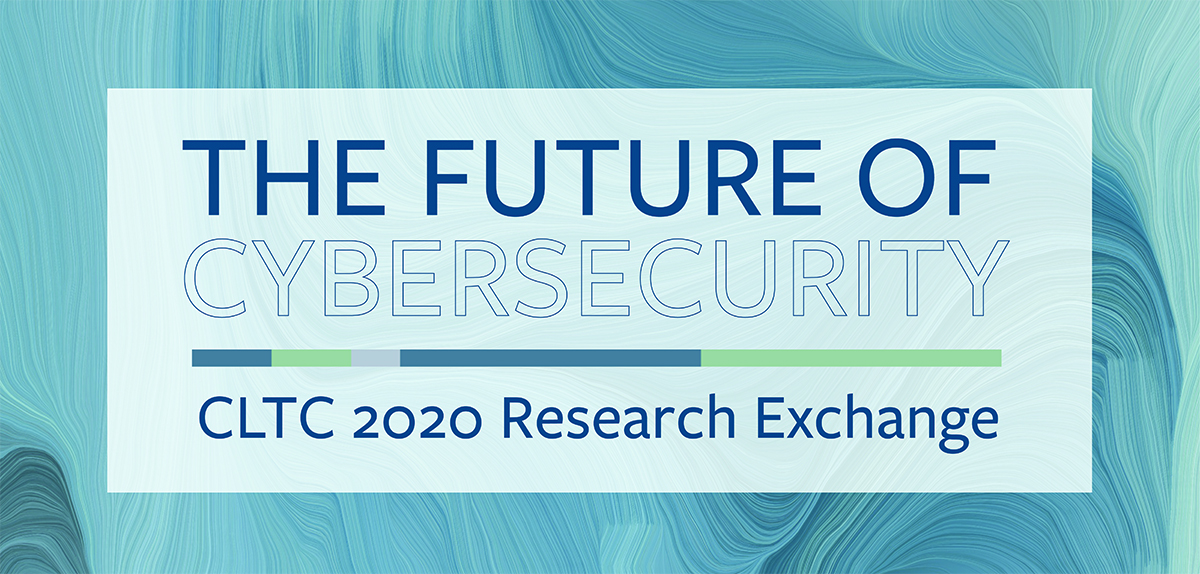The CLTC Research Exchange is an annual showcase of the research funded by the Center for Long-Term Cybersecurity. This year’s Research Exchange was presented as a series of online events, each with a distinct theme. In addition to showcasing research sponsored by CLTC grants, the events featured conversations with invited guests from industry, reflecting CLTC’s mission to be a two-way ‘bridge’ between the research community and practitioners in the field.
Click below to watch comprehensive recordings of each two-hour event, or simply click on individual talk titles to quickly find specific content. Enjoy!
Day 1: Cybersecurity and Privacy: Governance and Regulatory Regimes
Held on October 1, 2020, the first event in our Research Exchange series focused on “Cybersecurity and Privacy: Governance and Regulatory Regimes,” and featured an array of important research related to privacy and digital security.
Mobile App Privacy Analysis with AppCensus (14:22)
Serge Egelman, Research Director for the Usable Security & Privacy Group
Measuring and Defending Against New Trends in Nation-State Surveillance of Dissidents (5:29)
Bill Marczak, Postdoctoral Researcher, UC Berkeley Department of Electrical Engineering and Computer Sciences (EECS)
Internet Fragmentation: Beyond ‘Free’ and ‘Open’ (11:44)
Nick Merrill, Research Fellow at CLTC and Director of the Daylight Security Research Lab
A Cryptographic Study of Data Protection Laws (6:10)
Prashant Vasudevan, Postdoctoral Researcher, UC Berkeley
An Open Research Privacy Toolkit (4:46)
Nitin Kohli, PhD Student, UC Berkeley School of Information
Fireside chat with Amit Elazari, Director of Global Cybersecurity Policy, Intel Corporation (29:29)
CLTC Executive Director Ann Cleaveland talks with Amit Elazari, Director of Global Cybersecurity Policy for the Intel Corporation and a lecturer in the UC Berkeley School of Information.
Day 2: Protecting and Securing a More Inclusive Society Online
Recorded on November 12, the second event in the Research Exchange series was centered on “Protecting and Securing a More Inclusive Society Online.” Researchers showcased their work on how technology can be designed to make cybersecurity more accessible to underserved populations, who may be vulnerable to digital security threats, and who may have less technical training or resources.
Sounds Phishy: Protecting Consumers Against Phone Phishing (15:20)
Michelle Chen and Ashish Sur, alumni from the Master of Information Management and Systems program, UC Berkeley School of Information
Low-income Patients’ Perspectives on Health Data Privacy and Security (5:38)
Laura Gomez-Pathak, PhD student, UC Berkeley School of Social Welfare
Enabling Online Anonymity for Vulnerable Individuals and Organizations (15:17)
Venkatachalam Anantharam, Professor of Electrical Engineering, Department of Electrical Engineering and Computer Science (EECS), UC Berkeley
Privacy Controls for Always-Listening Devices (5:45)
Nathan Malkin, PhD student, EECS; Recipient of the 2020 Cal Cybersecurity Fellowship
Usability of Privacy and Security Settings in Smartphones (17:03)
Alisa Frik, Postdoctoral Researcher, UC Berkeley International Computer Science Institute (ICSI)
Cybersecurity for Non-Primary and Primary Users of Always-On Internet of Things Devices: An Ethnographic, Participatory, and Multidisciplinary Design Approach (5:06)
James Pierce, Assistant Professor of Design, California College of the Arts; Researcher, UC Berkeley CITRIS and Banatao institute
Expanding Diverse Talent in the Cybersecurity Workforce (24:35)
CLTC Executive Director Ann Cleaveland; Lisa Parcella, VP of Product Management & Marketing for Security Innovation and a member of the International Consortium of Minority Cybersecurity Professionals (ICMCP); and Sandra Wheatley Smerdon, SVP, Marketing, Threat Intelligence and Influencer Communications at Fortinet.
Day 3: Long-Term Security Implications of AI/ML Systems
The third and final event in the 2020 Research Exchange Series, “Long-Term Security Implications of AI/ML Systems,” was held on December 10. Talks centered on how leaders across technical, institutional, and policy domains can support trustworthy development and deployment of AI systems, and on key decision points that will have the greatest impact on the trajectory of AI security today and into the future.
Covert Embodied Choice: Decision-Making, VR, and the Limits of Privacy Under Biometric Surveillance (14:59)
Jeremy Gordon, PhD student, UC Berkeley School of Information
Novel Metrics for Robust Machine Learning (5:33)
N. Benjamin Erichson, Postdoctoral Researcher, UC Berkeley Department of Statistics
Secure Machine Learning (14:03)
David Wagner, Professor of Computer Science, UC Berkeley
Detecting Images Generated by Neural Networks (6:36)
Alexei Efros, Associate Professor, UC Berkeley Department of Electrical Engineering and Computer Science
What Is My Data Worth? Towards a Principled and Practical Approach for Data Valuation (15:08)
Ruoxi Jia, Assistant Professor, Department of Electrical and Computer Engineering, Virginia Tech
Hands-on Teaching Tools for Identifying and Addressing Machine Learning Bias (3:10)
Inderpal Kaur, Research Assistant, Daylight Security Research Lab
(Non-) Private Machine Learning (13:01)
Nicholas Carlini, Research Scientist, Google Brain
Implementing Trustworthy AI for the Long-term: A View from the Field (28:56)
CLTC Executive Director Ann Cleaveland; Rachel Azafrani, AI and IoT Security Strategist at Microsoft; Priyanka Saxena, Senior Engagement Leader, Deloitte.

